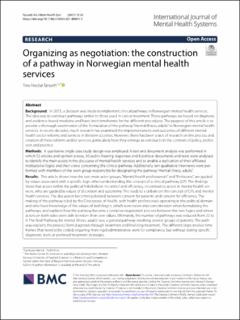| dc.description.abstract | In 2015, a decision was made to implement clinical pathways in Norwegian mental health services. The idea was to construct pathways similar to those used in cancer treatment. These pathways are based on diagnosis and evidence-based medicine and have strict timeframes for the different procedures. The purpose of this article is to provide a thorough examination of the formulation of the pathway “mental illness, adults” in Norwegian mental health services. In recent decades, much research has examined the implementations and outcomes of different mental health sector reforms and services in Western societies. However, there has been a lack of research on the process and creation of these reforms and/or services, particularly how they emerge as constructs in the contexts of policy, profession and practice.
Methods
A qualitative single case study design was employed. A text and document analysis was performed in which 52 articles and opinion pieces, 30 public hearing responses and 8 political documents and texts were analysed to identify the main actors in the discourse of mental health services and to enable a replication of their affiliated institutional logics and their views concerning the clinical pathway. Additionally, ten qualitative interviews were performed with members of the work group responsible for designating the pathway “mental illness, adults”.
Results
This article shows how the two main actor groups, “Mental health professionals” and “Politicians”, are guided by values associated with a specific logic when understanding the concept of a clinical pathway (CP). The findings show that actors within the political field believe in control and efficiency, in contrast to actors in mental health services, who are guided by values of discretion and autonomy. This leads to a debate on the concept of CPs and mental health services. The discussion becomes polarized between concern for patients and concern for efficiency. The making of the pathway is led by the Directorate of Health, with health professionals operating in the political domain and who have knowledge of the values of both logics, which were taken into consideration when formulating the pathways, and explains how the pathway became a complex negotiation process between the two logics and where actors on both sides were able to retain their core values. Ultimately, the number of pathways was reduced from 22 to 9. The final “Pathway for mental illness, adults” was a general pathway involving several groups of patients. The pathway explains the process from diagnosis through treatment and finalizing treatment. The different steps involve time frames that need to be coded, requiring more rigid administrative work for compliance, but without stating specific diagnostic tools or preferred treatment strategies.
Conclusions
This article shows that there is also a downside of having sense making guided by strong values associated with a specific institutional logic when constructing new, and hopefully better, mental health care services. This article demonstrates how retaining values sometimes becomes more crucial than engaging in constructive debates about how to solve issues of importance within the field of mental health care. | en_US |

